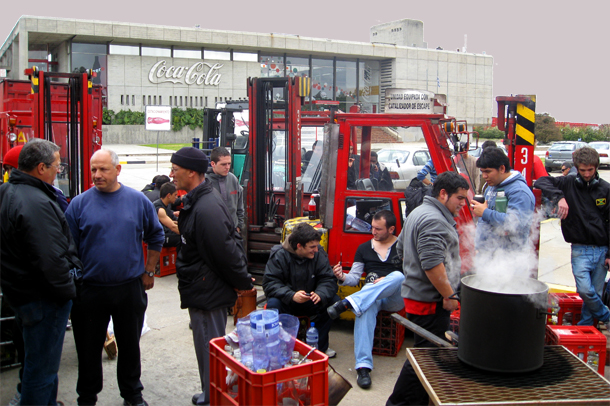In a discussion
with Sirel, the president of the Union of Coca Cola Workers of Uruguay (STCC),
explained the reasons that led to this occupation. This afternoon there will be
a discussion with management.
-The Coca Cola Plant of Montevideo has been occupied... Why?
-The General Meeting of the Federation of Beverage Workers and Employees (FOEB)
held on Friday 29, unanimously empowered the Executive Committee to take the
actions considered appropriate within the framework of this conflict with
companies. In this context, today at 2 am the
Coca Cola plant
was occupied within an environment of normality with company management who
sealed a part of the plant and then delivered the gate keys.
-What was the origin of this conflict?
-During the present negotiations within the Wage Councils, our demands contained
four items: 12.3 percent wage increase valid for two-years with adjustments
every six months; 11 paid days of leave for women workers for being mothers
because many times they need to be absent or leave early to take care of family
problems or emergencies related to their children, but such days are not
accumulative; the opening of a dialogue in all plants about the reduction of
work days to 6 hours, i.e. a 36-hour week for the same wages; a new evaluation
of categories in the areas of Administration and Sales (including marketing)
because these two departments are ruled by evaluations of 1985.
-What was the position of companies faced with these demands?
-They had not raised major inconveniences, we were virtually in agreement. But
when we received their draft agreement, apart from these items, they had
included several clauses that had not been discussed. One of them includes
elements that could be damaging for union action, but the worse was that they
established that the Collective Agreement will expire two years after this
agreement.
We understand this for wages, they depend on the general economic situation of
the country. It is admissible that in 2012 we might be living a very different
reality from today, and in this case we agree to discuss wages again. In fact it
is what we always do. But we cannot accept that the full Collective Agreement
will expire, including benefits.
|
We cannot accept that the full Collective Agreement will expire,
including benefits. |
-Companies claim publicly that such clauses, which they call "union peace", have
always been included in all previous Collective Agreements and have not caused
problems. Is it true?
-No it isn't. The
fact that a Collective Agreement entirely expires at the end of the wage
agreement has never been in any other previous agreement. There
has always been language stating that at the end of the period "a new agreement
will be discussed". But, by introducing the term "expire", this unprecedented
factor is included, which we cannot ignore because it implies fully coming to an
end.
There has never been
anything similar. We deny it flatly. They have mixed traditional elements of our
Collective Agreements with things that have never been discussed.
-How long will this occupation last?
-Our strategy will be defined moment to moment by the leadership of the
Federation. It is possible that the occupation continues and it is also possible
that another plant is occupied, or that two plants be occupied at the same time.
This will be decided as we go along.
The fact is that there is a meeting today at 4 pm and then, according to the
outcome of such dialogue, the next steps will be decided.
Our estimation is that management has behaved inadequately by fully agreeing and
then, in a very unusual manner, presenting language with aspects not discussed
and unacceptable, which has led to this situation.
